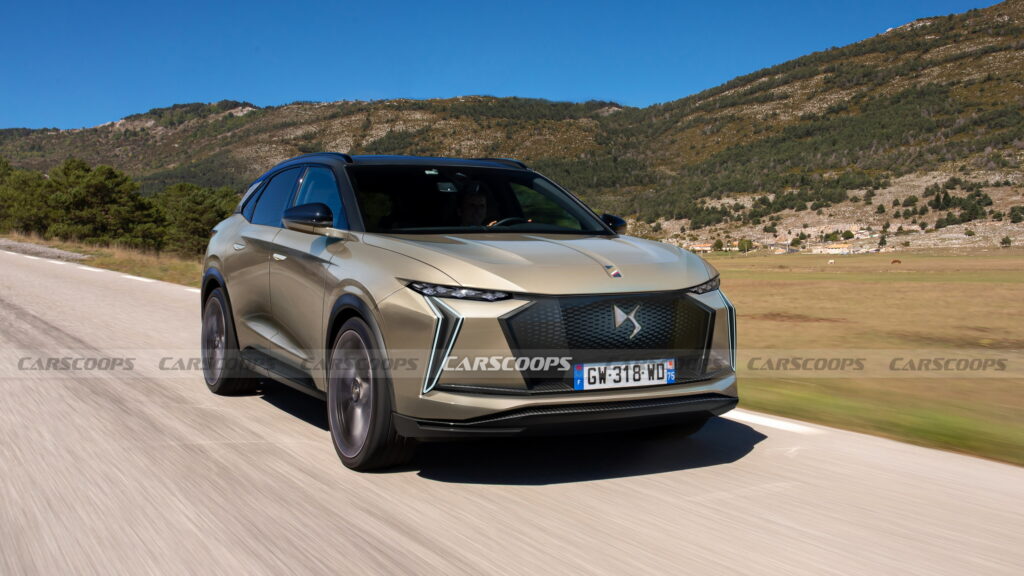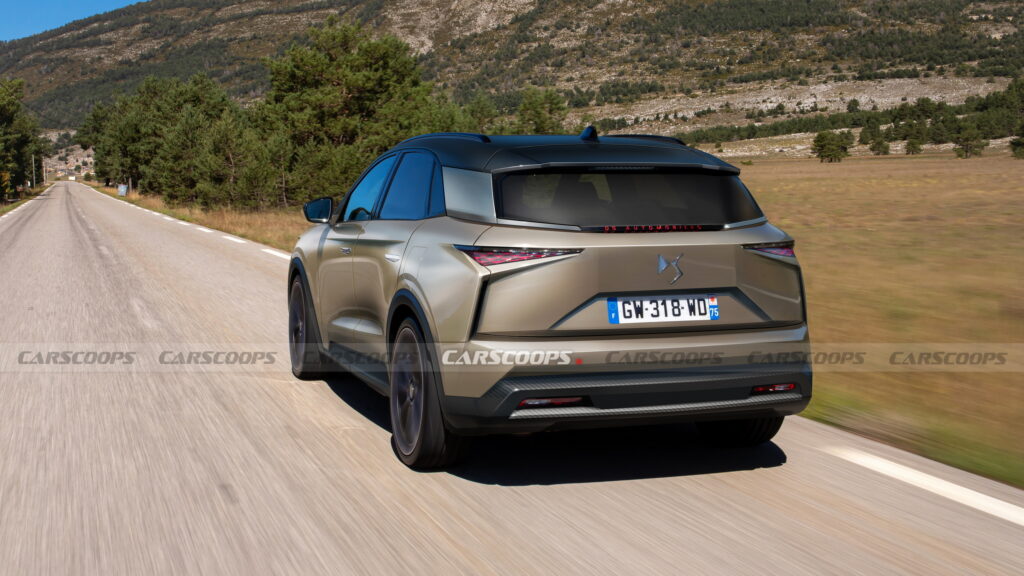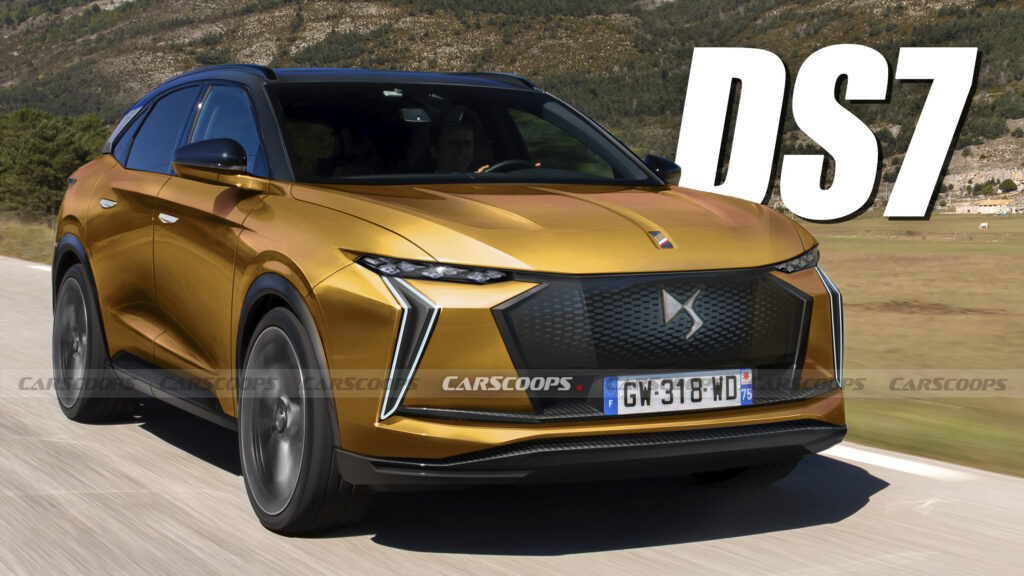- The next-gen DS7 will be larger, offering more tech and luxury with various powertrain options.
- Expected in late 2025 or early 2026, it will be built on the advanced STLA Medium architecture.
- The DS7 will be the premium sibling of the Peugeot 3008, Citroen C5 Aircross, and Opel Grandland.
The DS7 stands as one of DS Automobiles’ most successful models, making its renewal a crucial moment for the brand. The upcoming second generation of this crossover is set to debut within the next two years, featuring a comprehensive redesign and incorporating the latest Stellantis technology—including fully electric powertrain options.
The DS7 Crossback debuted in 2017 and received a facelift in 2022, when it was renamed simply DS7. Positioned as the most premium Stellantis SUV based on the EMP2 architecture, the DS7 sits above its mechanically-related counterparts: the Peugeot 3008, Citroen C5 Aircross, and Opel Grandland.
More: Classic Citroen DS To Inspire New DS Automobiles EV Flagship
With its aforementioned siblings gradually transitioning to the new STLA Medium architecture, it’s safe to assume that DS designers and engineers are hard at work on a similar upgrade.
Unlike the the upcoming DS8 flagship crossover, which has already been spotted testing, no camouflaged prototypes of the new DS7 have surfaced during its early development. However, this hasn’t deterred our artists from creating speculative renderings of the next generation, drawing inspiration from the French brand’s evolved design language.
Illustrations: Jean Francois Hubert/SB-Medien
Our illustrations showcase an SUV with a sleeker, more dynamic stance than the current DS7. The hexagonal grille still dominates the front bumper, but the headlights are slimmer and more aggressive, with sharper DRL extensions for a bolder look.
The profile is more sculpted, with the greenhouse taking cues from the smaller DS4 crossover. The rear end features slimmer, jewel-like taillights, decorative vents, and a streamlined lower fascia without visible exhaust pipes. In keeping with the automaker’s current strategy, the DS emblem is accompanied by “DS Automobiles” lettering, ensuring the SUV’s origins are unmistakable.
More: 2025 Peugeot E-5008 Gives Buyers What The Mighty Tesla Model Y Won’t
We anticipate the new DS7 to be larger than its predecessor, possibly approaching or exceeding the 4,650 mm (183.1 inches) length of the all-new Opel Grandland, which will also be mirrored by the upcoming Citroen C5 Aircross. Similarly, the DS7’s wheelbase is expected to extend from the current 2,730 mm (107.5 inches) to at least 2,784 mm (109.6 inches), providing additional space for rear passengers.
The DS7’s interior will undergo a significant overhaul, aiming to rival Mercedes, BMW, and Audi in perceived quality while incorporating the latest advancements in comfort, safety, and infotainment. The automaker previewed its future interior design direction with the futuristic DS M.i. 21 Manifesto concept in 2023. However, recent spy shots of the upcoming DS8 offer a clearer glimpse of how these concepts will be realized in production vehicles.
A Wider Choice Of Electrified Powertrains
As mentioned earlier, the second-generation DS7 will transition from the old EMP2 platform to the new STLA Medium architecture. This shift will enable DS Automobiles to offer a range of powertrains, including mild-hybrid, plug-in hybrid, and fully electric options, broadening its appeal in the SUV market.
Illustrations Jean Francois Hubert/SB-Medien
The entry-level DS7 is expected to feature the widely-used turbocharged 1.2-liter three-cylinder gasoline engine paired with a 48-volt system integrated into the six-speed dual-clutch gearbox. DS recently introduced this setup in the DS3 and DS4 lineups, so it would be surprising if the DS7 didn’t follow suit. However, with 134 hp (100 kW / 136 PS) from the ICE and 28 hp (21 kW / 28 PS) from the electric motor, the mild-hybrid DS7 won’t be built for performance.
Those seeking more power will gravitate toward the plug-in hybrid and fully electric versions of the SUV, both offering competitive zero-emission range figures.
The Peugeot E-3008 and E-5008 offer a choice between 73 kWh and 98 kWh battery packs, allowing up to 700 km (435 miles) of range. We also know that the single-motor FWD powertrain makes 207 hp (157 kW / 210 PS) or 227 hp (170 kW / 230 PS), while the flagship dual-motor AWD powertrain is good for 316 hp (240 kW / 320 PS). Expect similar specs from the fully electric DS7 E-Tense, combined with a brand-specific chassis setup focused on comfort and refinement.
DS Automobiles remains tight-lipped about its launch timeline beyond 2024. However, based on the gradual rollout of closely related models from other Stellantis brands, we can speculate that the second-gen DS7 could arrive in late 2025 or early 2026.
















